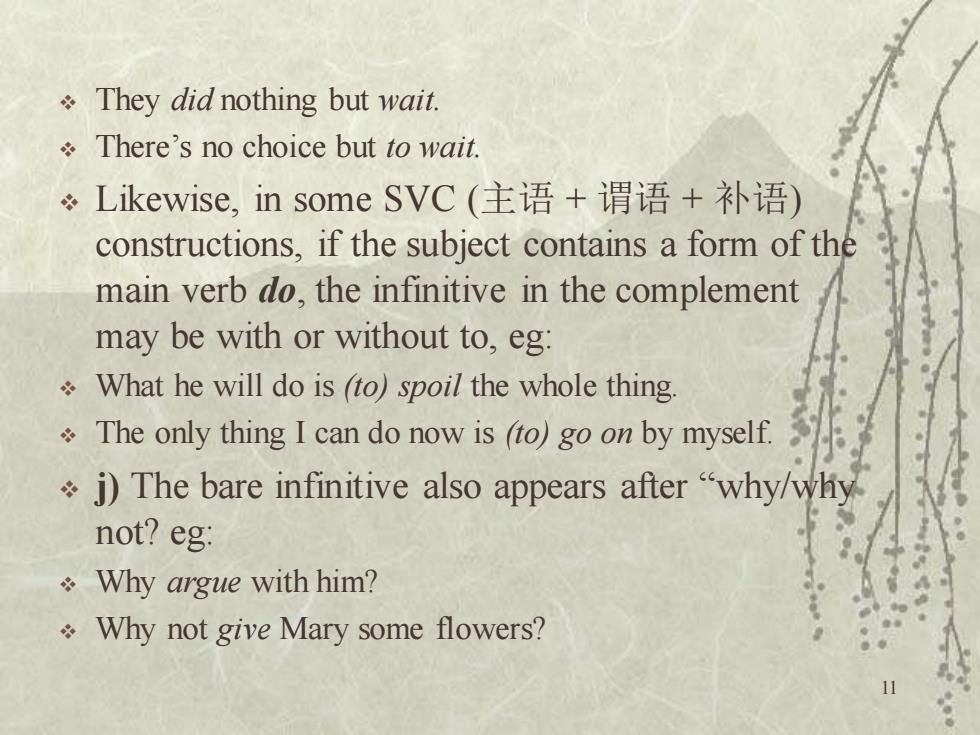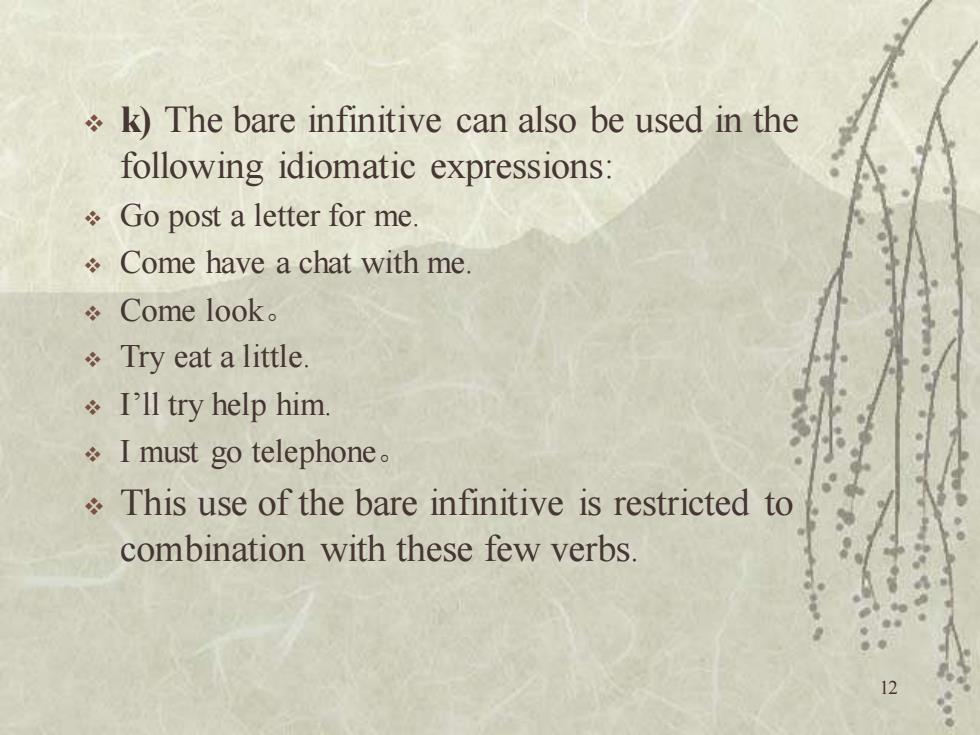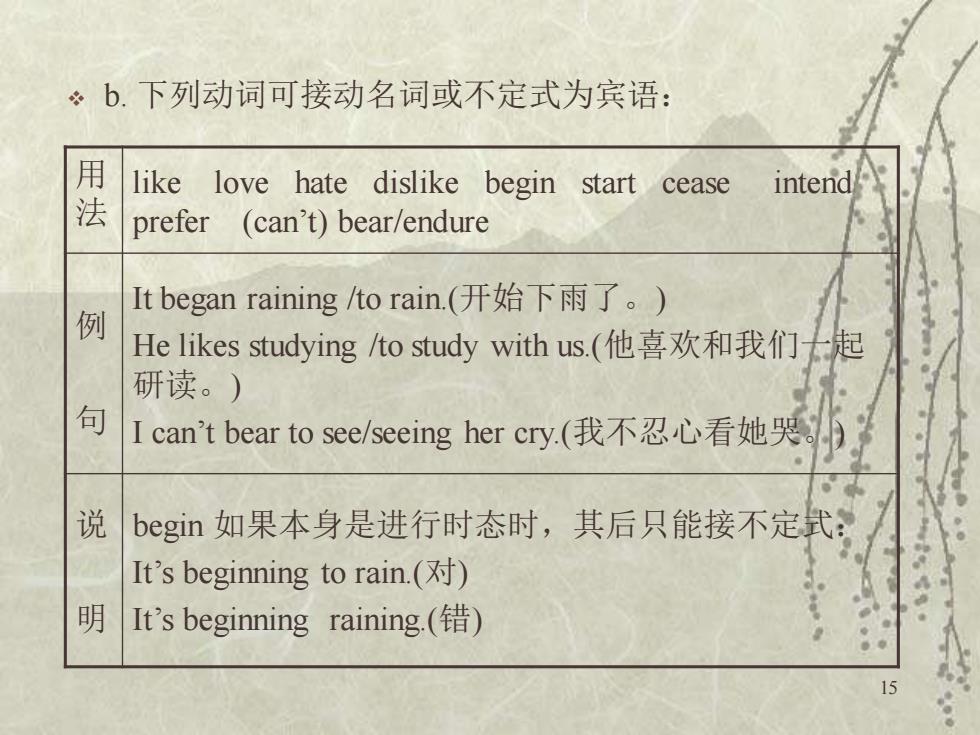
They did nothing but wait There's no choice but to wait. Likewise,in some SVC(主语+谓语+补语) constructions,if the subject contains a form of the main verb do,the infinitive in the complement may be with or without to,eg: What he will do is (to)spoil the whole thing. The only thing I can do now is (to)go on by myself. j)The bare infinitive also appears after"why/why not?eg: Why argue with him? Why not give Mary some flowers?
11 ❖ They did nothing but wait. ❖ There’s no choice but to wait. ❖ Likewise, in some SVC (主语 + 谓语 + 补语) constructions, if the subject contains a form of the main verb do, the infinitive in the complement may be with or without to, eg: ❖ What he will do is (to) spoil the whole thing. ❖ The only thing I can do now is (to) go on by myself. ❖ j) The bare infinitive also appears after “why/why not? eg: ❖ Why argue with him? ❖ Why not give Mary some flowers?

k)The bare infinitive can also be used in the following idiomatic expressions: Go post a letter for me. Come have a chat with me. ÷Come look。 ÷Try eat a little. ÷I'll try help him. ÷I must go telephone。 This use of the bare infinitive is restricted to combination with these few verbs
12 ❖ k) The bare infinitive can also be used in the following idiomatic expressions: ❖ Go post a letter for me. ❖ Come have a chat with me. ❖ Come look。 ❖ Try eat a little. ❖ I’ll try help him. ❖ I must go telephone。 ❖ This use of the bare infinitive is restricted to combination with these few verbs

2)动名词(Gerund) ÷动名词的构成与现在分词相同,即-ing A)Forms of the Gerund: 主动形式 被动形式 般式 doing being done 完成式 having done having been done B)Uses of the Gerund 功用 例 句 作主语 Swimming is good exercise. Collecting stamps is a good hobby. 作宾语 He enjoys fishing. I'm fond of swimming 作表语 Teaching is learning.(教学相长) His hobby is listening to music
13 2)动名词(Gerund) ❖ 动名词的构成与现在分词相同,即-ing ❖ A)Forms of the Gerund: ❖ B) Uses of the Gerund 主动形式 被动形式 一般式 doing being done 完成式 having done having been done 功用 例 句 作主语 Swimming is good exercise. Collecting stamps is a good hobby. 作宾语 He enjoys fishing. I’m fond of swimming. 作表语 Teaching is learning.(教学相长) His hobby is listening to music

C)Contrast between the Gerund and the infinitive 动名词与不定式都可作动词的宾语。但有些动 词之后须接不定式,有些动词仅能以动名词作 为宾语,又有些动词既可用不定式也可用动名 词作为宾语。 a. 下列动词通常以动名词为宾语 用 admit appreciate avoid complete consider delay 法 deny enjoy escape finish mind miss postpone practice quit 例 I must avoid doing such a thing. He admitted having seen the man before. 句 He postponed visiting his friend. We are considering taking a trip to Europe
14 ❖ C) Contrast between the Gerund and the infinitive ❖ 动名词与不定式都可作动词的宾语。但有些动 词之后须接不定式,有些动词仅能以动名词作 为宾语,又有些动词既可用不定式也可用动名 词作为宾语。 ❖ a. 下列动词通常以动名词为宾语 用 法 admit appreciate avoid complete consider delay deny enjoy escape finish mind miss postpone practice quit 例 句 I must avoid doing such a thing. He admitted having seen the man before. He postponed visiting his friend. We are considering taking a trip to Europe

。b.下列动词可接动名词或不定式为宾语: like love hate dislike begin start cease intend 法 prefer (can't)bear/endure It began raining /to rain.(开始下雨了。) 例 He likes studying /to study with us.(他喜欢和我们f起 研读。) 句 Ican't bear to see/seeing her cry..(我不忍心看她哭) 说 begn如果本身是进行时态时,其后只能接不定式 It's beginning to rain.( 明 It's beginning raining.()
15 ❖ b. 下列动词可接动名词或不定式为宾语: 用 法 like love hate dislike begin start cease intend prefer (can’t) bear/endure 例 句 It began raining /to rain.(开始下雨了。) He likes studying /to study with us.(他喜欢和我们一起 研读。) I can’t bear to see/seeing her cry.(我不忍心看她哭。) 说 明 begin 如果本身是进行时态时,其后只能接不定式: It’s beginning to rain.(对) It’s beginning raining.(错)